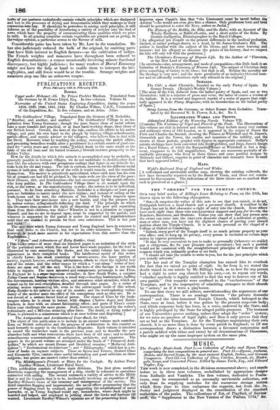THE "ORDERS" )'OR THE TEMPLE CHTTIICH.
Oen very brief notice of Billing's Laws Relating to Pews, on the 15th, has drawn upon us the following objurgation.
." Sin—It surprises the writer of this note to see that you cannot, or do not, distinguish between a local church and a personal church. A resident in the Temple has not in that character a right of entry into the chureh. None others have such right than those who EXCLUSIVELY support and pay for if—viz. the Benchers, Banisters, and Students. Unless you can show that any person save the owner can enter into the PRIVATE domestic chapel of a nobleman or gentle- man or other man,_ you have not the slightest chance of proving your absurd position about the Temple Church. It is as much personal as the chapel of a College at Oxford or Cambridge. Indeed, every part of the Temple itself is as much private property as year own office; and, to keep up its privacy, every person is excluded on certain days unless by express permission.
"It may be very convenient to you to make us personally (wherever we reside) pay a clergyman, att, for your pleasure and convenience: but such a position would not be consistent with the straightforward principles of honesty in other respects which you ordinarily profess. or set forth. " I should not take the trouble to write to you, but for the just principles which you usually advocate."
The hot zeal of the Templar champion has caused him to overlook the fact that we raised no point of right. So far from hove stated the doubt raised in our minds by Mr. Billing's book, as to how far any person had a right to enter any church but his own,—or, to repeat our words, "whether anybody is legally entitled to find the way to heaven out of his own parish." Our remarks were confined to the " exclusiveness " of the Templars, and to the impropriety of admitting strangers to their church
by " orders " as if it were a playhouse. To our "orders,"
views we still adhere, notwithstanding the arguments of oar correspondent. There is no analogy between "the private domestic chapel" and the time-honoured Temple Church, which belonged to the State, once at least, before it was gotten by the present corporate body; and which corporate body has been, in a sense endowed by the State, and is highly privileged by the State for alleged public purposes. The instant* of our Universities proves nothing, unless they adopt the " order " system; for we raise no question of legal right; and then it only proves that they are as bad as the Templars. As for the Templars maintaining their own church, it is no more than is done by every parish in England; or (if our correspondent draws a distinction between a favoured corporation and a parish saddled with tithes and rates) by all denominations of Diseeateks, who might set up the same improper system on the same plea.


























 Previous page
Previous page